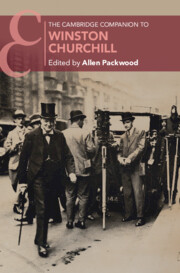Book contents
- The Cambridge Companion to Winston Churchill
- The Cambridge Companion to Winston Churchill
- Copyright page
- Contents
- Figures
- Contributors
- Foreword
- Acknowledgements
- Abbreviations
- Introduction
- 1 Churchill’s Contested History
- 2 The Inheritance of Winston Churchill
- 3 Learning Lessons
- 4 Churchill As a Writer and Orator
- 5 Churchill and Social Policy
- 6 Churchill, the ‘Irish Question’ and the Irish
- 7 Churchill’s First World War
- 8 Churchill, Art and Politics
- 9 Churchill’s Economics
- 10 Churchill, the Roosevelts and Empire
- 11 Churchill, India and Race
- 12 Churchill’s Campaign against Appeasement
- 13 Churchill As War Leader
- 14 Churchill, The English-Speaking Peoples and the ‘Special Relationship’
- 15 Churchill As International Statesman
- 16 Churchill and the Bombing Campaign
- 17 The Influence of Clementine Churchill
- 18 Churchill and the ‘United States of Europe’
- 19 Indian Summer or Conservative Winter?
- Conclusion
- Book part
- Index
- References
16 - Churchill and the Bombing Campaign
Published online by Cambridge University Press: 19 January 2023
- The Cambridge Companion to Winston Churchill
- The Cambridge Companion to Winston Churchill
- Copyright page
- Contents
- Figures
- Contributors
- Foreword
- Acknowledgements
- Abbreviations
- Introduction
- 1 Churchill’s Contested History
- 2 The Inheritance of Winston Churchill
- 3 Learning Lessons
- 4 Churchill As a Writer and Orator
- 5 Churchill and Social Policy
- 6 Churchill, the ‘Irish Question’ and the Irish
- 7 Churchill’s First World War
- 8 Churchill, Art and Politics
- 9 Churchill’s Economics
- 10 Churchill, the Roosevelts and Empire
- 11 Churchill, India and Race
- 12 Churchill’s Campaign against Appeasement
- 13 Churchill As War Leader
- 14 Churchill, The English-Speaking Peoples and the ‘Special Relationship’
- 15 Churchill As International Statesman
- 16 Churchill and the Bombing Campaign
- 17 The Influence of Clementine Churchill
- 18 Churchill and the ‘United States of Europe’
- 19 Indian Summer or Conservative Winter?
- Conclusion
- Book part
- Index
- References
Summary
Through pinpointing how Churchill’s perceptions of aerial bombardment evolved across his political career, this chapter highlights the ambivalence and incongruence that dogged his bombing policy from its earliest days: ultimately arguing that his vacillating approach towards the Allied bombing campaign – and his eventual calculated detachment from it – was not out of character. The chapter begins by establishing his preliminary beliefs about aerial bombardment; next, it traces how his bombing theory converted into destructive reality, from ‘aerially policing’ the British Empire in the 1920s to the Combined Bomber Offensive; finally, it examines how Churchill attempted to reconcile his incriminating role in the German firestorms with a war-scarred Britain after 1945.
Keywords
- Type
- Chapter
- Information
- The Cambridge Companion to Winston Churchill , pp. 316 - 341Publisher: Cambridge University PressPrint publication year: 2023

